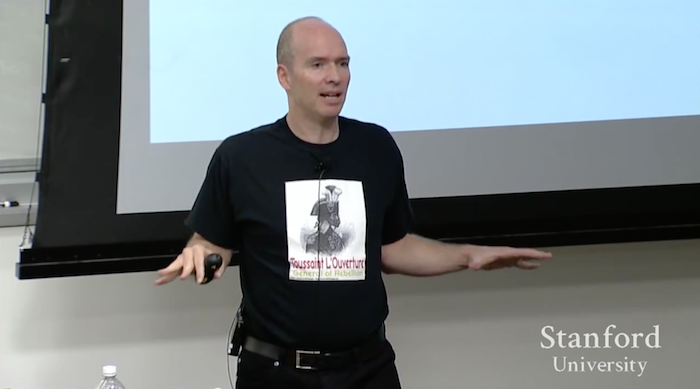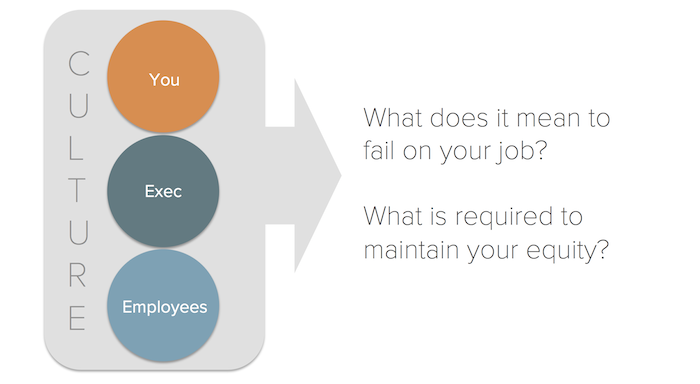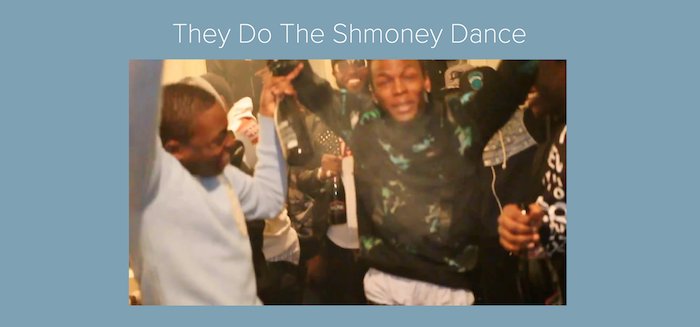Ben Horowitz: Dismissal, Promotions and Transfers

Stanford course CS183B: How to start a startup . Started in 2012 under the leadership of Peter Thiel. In the fall of 2014, a new series of lectures by leading entrepreneurs and Y Combinator experts took place:
Second part of the course
First part of the course
- Sam Altman and Dustin Moskovitz: How and why to create a startup?
- Sam Altman: How to form a start-up team and culture?
- Paul Graham: Illogical startup ;
- Adora Cheung: Product and Honesty Curve ;
- Adora Cheung: The rapid growth of a startup ;
- Peter Thiel: Competition - the lot of losers ;
- Peter Thiel: How to build a monopoly?
- Alex Schulz: An introduction to growth hacking [ 1 , 2 , 3 ];
- Kevin Hale: Subtleties in working with user experience [ 1 , 2 ];
- Stanley Tang and Walker Williams: Start small ;
- Justin Kahn: How to work with specialized media?
- Andressen, Conway and Conrad: What an investor needs ;
- Andressen, Conway and Conrad: Seed investment ;
- Andressen, Conway and Conrad: How to work with an investor ;
- Brian Cesky and Alfred Lin: What is the secret of company culture?
- Ben Silberman and the Collison Brothers: Nontrivial aspects of teamwork [ 1 , 2 ];
- Aaron Levy: Developing B2B Products ;
- Reed Hoffman: On Leadership and Managers ;
- Reed Hoffman: On the leaders and their qualities ;
- Keith Rabois: Project Management ;
- Keith Rabua: Startup Development ;
- Ben Horowitz: Dismissal, promotion and reassignment ;
- Ben Horowitz: Career advice, westing and options ;
- Emmett Shire: How to conduct interviews with users;
- Emmett Shire: How to talk to users in Twitch ;
- Hossein Rahman: How hardware products are designed in Jawbone;
- Hossein Rahman: The Design Process at Jawbone.
Ben Horowitz: When Sam first sent me a letter asking me to do this activity, he wrote: “Ben, could you give a lecture on management for 50 minutes?” I immediately thought, “Here are the cases, I just wrote a book on management 300 pages. It turns out my book was too long. ”
')
I did not have time to cut the material by 300 pages so that I could tell it in 50 minutes. As Mark Twain said, "I did not have time to write a good short letter, so I will write a long one." But for that matter, I will explain only one of the concepts of management.

I notice that CEOs most often have problems with understanding this particular concept, starting from the moment when their company is still small, and ending with the stage when their company becomes really large. In theory, it [the concept] is very simple, but to succeed in its implementation is not easy. This concept was well reflected in his song Sly and the Family Stone: “Sometimes I am right and sometimes not. Everything I believe in is in this song. ”
This is the audio version of today's lecture, so those with a very delicate musical taste can leave right now.

When you make a serious decision, you need to fully understand how people will interpret your actions. You need to evaluate your decision not only from your point of view or from the point of view of the person with whom you are discussing it, but also from the standpoint of all other people who are not at your side right now. In other words, when making important decisions, you should be able to evaluate them from the position of the company as a whole. It is necessary to analyze the point of view of each employee and then take it into account when forming his own. Otherwise, your decisions will have not entirely helpful "side effects" and potentially dangerous consequences. All this is not easy to implement, because during the decision you are under tremendous pressure.
The plan of the lecture will be as follows: we will look at four situations with you. First, I will tell about the reduction of workers in the position, which causes great experiences. Then we will discuss promotions that are also associated with strong feelings [ in this translation only these two cases will be considered, the rest will be released in Part 2 - approx. trans.]. After that, we'll analyze one of Sam's blog posts — I didn't warn him about that. I decided to make him a little nervous for inviting me to give such a short lecture after I wrote a whole book about it.
Then I will tell you about the person who applied the science of management best in history. I wear a t-shirt with his image, as a tribute to him. We will discuss how he managed to do what no one could do before and after. , in its original form, the state did not last long) - approx. trans.]. He mastered the technique, which I will talk about in this lecture.
Downgrade or fire
So, here is the first situation that we will analyze: you have a sales director, and the question arises whether to lower it or fire it. This example is based on a real situation that occurred when I worked with one CEO. In general, the situation was as follows: he hired an excellent sales director, who began to work harder than anyone in the company and fulfill all that was required of him. Everybody liked him, because he worked well and in general was not a stupid person, but some tasks turned out to be too tough for him. He did not have enough knowledge and skills to carry out what the company demanded of him and simply cope with the competition from other employees. Thus, the executive director could not leave him in this position, despite the fact that the man was an excellent employee. The question is whether to dismiss this person, or simply to lower him in the post, after which he will be subordinate to someone else. The second option sounds good. Let's look at how you make this decision.
In this case, you are in the role of executive director. This situation turns out to be really difficult if an employee comes to work every day at six in the morning, works until ten in the evening and at the same time tries the most in the company. In this case, it is very difficult to say: “Well, I am very sorry. You did a great job, but for your efforts you do not get an excellent mark. You get a "bad" because I'm firing you. "
No one wants such a conversation. The demotion in this case seems correct from the point of view of the executive director, since the employee may remain in the company. After all, he tried so hard. He is a great example of a really hard worker. He also has many friends in the company, so from the point of view of corporate culture, such a decision will be successful in any case, as the person saves the job. After that, I can hire someone who will solve my problem, but I do not need to create additional difficulties.
This is what the sales director might think about: “I don’t want to be demoted, but I want to be fired even less because it will be much harder to explain to my next employer. If you look at it from the other side, they didn’t even lower me - I just got a new job just below the rank. ”
And the last thing that gives such a solution: employees feel that the company values them all. The management brought them to the company, concluded an agreement with them and provided an opportunity to develop together with the company. In this vein, our conversation took place with the CEO. And I told him: “Wait a second. Let me find out this: what share in the company's income can this sales director claim? ”He asks me:“ What do you mean? ”I answer him:“ I would like to know the specific meaning. Does he own shares at the level of vice president? Does he own a share of 1.5% or 0.4%? ”
This made the director think. Then he replied: "The share of this person in the company is blurred to 1.5%." And to this, I answer him: “Good. Imagine that in your company you work as an engineer. How would you treat a person who used to be the head of the sales department and owned a one and a half percent share? How much do your engineers get - 0.1% -0.2% of company profits? And after that, how will they relate to the person who no longer is the head of the sales department and at the same time owns 1.5%? ”Then he held out:“ Nuuuu ... ”To which I replied:“ Exactly. How honest is that? Are you going to reduce his stake in the company? Are you ready to go for it? How do you think how productive it will work after that? Finally, will the workers respect him even after he was demoted? ”After all, they knew him as a person with high status, and now he was lowered. Another employee will tell him: “I knew you when you were the head of the sales department, and now you’ve become the regional manager and after that you will tell the hell you what to do? Are you saying that I should call this and that? It seemed to me, or you were demoted? Who are you to tell me? I am a promising specialist, and I will become the next head of the sales department in the company. ”

All these points matter. At first glance it may seem that you are solving a problem with one person, that you are lowering or firing only one employee. You wonder how it will affect this person.
However, in reality, you decide how to treat those who cannot do their job efficiently.
In this case, we are talking about the highest paid job in the company in terms of the employee’s share in corporate profits. Then the question arises, what is required to save this share? Is it enough just to try or need to achieve some kind of result? In different situations, the answer will be different. We can talk about a person who was not hired from another company immediately to the position of sales director, a person whom you have promoted in the past - then he may simply not be paid a theoretically due share. In this case, you will probably make a different decision, but you should understand how it will affect all employees, and not just the person whose position in the company is currently being discussed.
What to do with the request for a raise?
Second example: an excellent employee asks for your promotion. He is a great worker, not like the one in the previous example. The first thing that comes to your mind is that he is really good and asks for a promotion, not without a reason. He asks for it, because he believes that he deserves a promotion, and at the same time you do not want to lose an employee. He worked well and you want to be fair to him. Are you sure that if you give a boost to this person, everyone will be grateful to you, and things will go uphill. Great, so be it!
As a leader, you understand how you would like to do when someone asks for a promotion. But what if you look at it from an employee? How will he react to the promotion? You must understand how employees come to the decision to ask you for a promotion. It does not happen that they wake up one morning and suddenly decide to ask for a raise. People think of such things for a very long time. They compare different options. They can also make an offer from other companies. They may be discussing this for a long time with their spouse. This is a very important step. If you give them a promotion, then most likely they will be very happy. It may, of course, happen that they will regard this with suspicion. But this is unlikely. In most cases, they will behave like this :

For those who do not know, this is Bobby Shmurda (Bobby Shmurda) and Rowdy Rebel perform Shmoney Dance . That is the reaction you get. And there will be many more situations where you can, for example, say: “Do you know that my employees read the book of Cheryl? They really “accepted the challenge,” as she writes in her book, and I want to encourage them for their work. ”
Do not misunderstand me, I do not criticize Cheryl - you can learn a lot from her book. However, you should consider how employees will feel who have not asked for a promotion. Perhaps they did their job better than the employees who applied for promotion, and they think like this: “Good. So, I did not ask for a promotion and did not receive it, and these people asked and received. What does this mean? ”Firstly, it means that you are biased in assessing the merits of your employees. You just give a raise to the first person to ask for it. They think: “So, I should either ask for a promotion, although it is not typical for me — I just do my job — or I need to quit my job and get into a company that objectively assesses a good job.” Thus, you can greatly upset a person who has not received a promotion. Do not think that when someone walks alone in the office while dancing and singing, the others will not notice it.
They will be beside themselves because of this boost. You can give an increase to the employee under conditions of complete confidentiality, but all the same it will become known to all.
The team will come to the conclusion that each employee now bears the duty of his family to ask for a promotion, because if he does not, he will lose in the competition. You can ask any executive with a lot of experience and he will tell you that this is true. If you hand out promotions to those who simply asked for it, as a result, a whole crowd of employees will start asking you to do the same. So you show how workers need to behave.
What to do in this situation?
The correct answer is to comply with the formalities for the preservation of corporate culture.
And I know that this causes disgust among startups: “I don’t want to follow a lot of formalities and don’t want to create a lot of special procedures. I want everything to be natural. We will practice yoga and smoke only organic "weed". Sorry, so would Peter Thiel argue, of course. Most recently, Peter took very seriously the question of who smokes the grass.
However, adherence to formal procedures maintains the integrity of the corporate culture. This means that you intend to analyze all the information. “From now on, we introduce a special procedure for those who want to raise: an employee needs to come and talk to me. I will not give you a boost right away, but I will be glad to hear your story. I will communicate with all the staff you work with to understand how to do better. I will evaluate all the work you have done according to my specific criteria. I will do this from time to time, but not every day. Most often - once every six months, or perhaps every four months. Upon completion of this procedure, I will say what kind of improvement is waiting for you - that is, whether you get it at all or not. But I am not going to depart from the formal procedure and I am not going to give a promotion as soon as I was asked about him. There is a certain order, and that's all. ”
When I was the executive director, and the subdivision directors were subordinate to me, I understood this thing: the higher you go up the career ladder, the more difficult it is to make such decisions, because the people you work with become more assertive. The positions of the head of the department often have to be very assertive, as is usually the case in most companies when people rise to this level. I talk to them in this vein: “Listen, you can argue with me as much as you need after the completion of the procedure and after I give you a promotion, but you know what? I will not hear what you say. I have already completed the process. I analyzed your arguments, and the arguments of other employees. I run a company where a lot of people work, and you get what I think will be right for you. ”
Having a certain procedure makes employees more relaxed, so they don’t have to constantly worry about whether they are asking for a promotion that they deserve, or if they’re denied them just for what they look like. A person may not be too pleasant in communication, and not be a member of your golf club, and generally do not behave as you would like. But he does not need to worry about this because the employee knows the formal procedure. You will analyze the work of all employees, and then give him what he deserves. This is a more effective way to solve this problem, and it takes into account the opinion of all employees, and not just the person who came to discuss with you their promotion.
 Announcement:
Announcement:With the continuation of Ben's lecture, you will be able to familiarize yourself in the coming days, and today (June 3 from 6.30 pm to 9.30 pm) you have the opportunity to look at the life of an accelerator of IT start-ups with your own eyes by visiting the FRIA Accelerator Open Day .
In addition to communicating with experts, you can learn about the conditions for obtaining investments and legal requirements for projects.
Source: https://habr.com/ru/post/291186/
All Articles